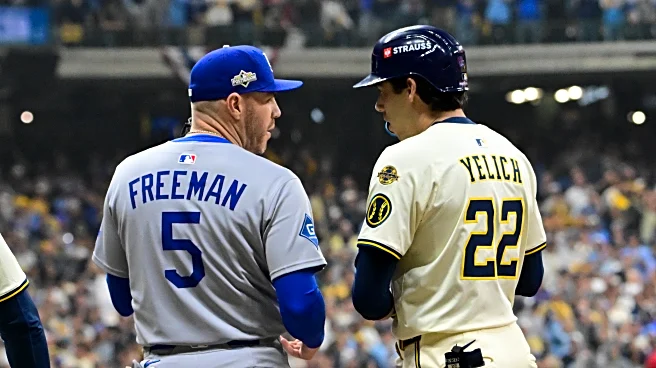You couldn’t make up a better “David vs. Goliath” postseason matchup than the one we have in the National League Championship Series.
Per Spotrac, the Dodgers had the highest luxury-tax payroll in MLB this year, $288,226,661. They’ve got star power from Shohei Ohtani to Freddie Freeman to Clayton Kershaw.
Meanwhile, the Brewers’ luxury-tax payroll this year was $60,086,666 — less than a quarter of the Dodgers’ payroll and ranking 24th overall. They’ve got young players like Sal Frelick, Caleb Durbin,
Jackson Chourio and Brice Turang leading the way. As Cubs fans who saw the teams play each other 18 times this year, we’re familiar with those players, but outside Chicago and Milwaukee, many baseball fans are saying, “Who?”
ESPN’s Jeff Passan recently wrote this long article in which he makes the case that the NLCS winner, presuming it’s the Dodgers, could embolden some owners to be even more hard-line about a salary cap for the CBA negotiations which will be coming up at the end of 2026:
Owners across the game want a salary cap — and if the Dodgers, with their record $500 million-plus payroll, win back-to-back World Series, it will only embolden the league’s push to regulate salaries. The Brewers, consistently a bottom-third payroll team, emerging triumphant would serve as the latest evidence that winners can germinate even in the game’s smallest markets and that the failures of other low-revenue teams have less to do with spending than execution.
The truth, of course, exists somewhere in between. But in between is not where the two parties stake out their negotiating positions in what many expect to be a brutal fight to determine the future of the game’s economics.
Incidentally, it should be noted that the ALCS teams, the Blue Jays and Mariners, rank third and 18th in tax payroll, respectively, so on a somewhat smaller scale, we are seeing this have vs. have-not battle in the other league as well.
So what of Passan’s argument? Craig Calcaterra, who writes a daily baseball newsletter and for a decade ran NBC’s Hardball Talk, doesn’t buy it:
The answer is that competitive balance had nothing to do with salary caps, then or now. Owners want labor costs down because they want labor costs down, just like every single other business out there. The competitive balance appeals are for P.R. purposes only. They are to get the press and fans on their side. They want fans and reporters to point at the Dodgers and say “look at those rich guys ruining baseball!”
While this is true, keep in mind (and Craig points out) that many fans were on management’s side through previous strikes and lockouts, blaming “greedy players” for the stoppages. That’s no longer the case, I don’t think. Many fans have realized that players are the game and who would you rather have the money? Millionaires or billionaires? While fans aren’t on that sort of financial level, I think most are currently on the side of the players.
So while it is true that owners want costs down because they want baseball to be “like every single other business out there,” baseball (and all sports) are different, I think, because of the extreme fan loyalty most fans have to their teams. You don’t feel that sort of thing about breakfast cereals or underwear or auto parts or most products. But we all love the Cubs, sometimes irrationally. It’s the nature of being a sports fan. I mean, why am I here running a Cubs website and writing about the team every day in the way I do? It’s because SB Nation was created for that specific purpose, to have fans writing about their teams from a fan standpoint, not the supposedly dispassionate writing you find in the mass media.
I’ve digressed, but only a bit. It’s that sort of fandom that drives all pro sports. Without us buying tickets and subscribing to cable and streaming services, where would the professional leagues get the money to pay all the millions of dollars players get? So both players and team owners, I think, need to be cognizant of that.
To circle back to the “David vs. Goliath” comp of Brewers vs. Dodgers, I think both Passan and Calcaterra have points. Passan is saying that if the Dodgers win, owners can use that as a narrative to say, “See, we need a salary cap because the mighty Dodgers keep winning by spending all this money!” Calcaterra is saying, “Owners want to pay players less no matter what.” There’s truth in both of those positions.
What’s my conclusion here, then? Maybe I don’t have one, maybe we’re all just kind of “let’s wait and see what happens.” I did want to open up this topic for discussion, though, so have at it.
















